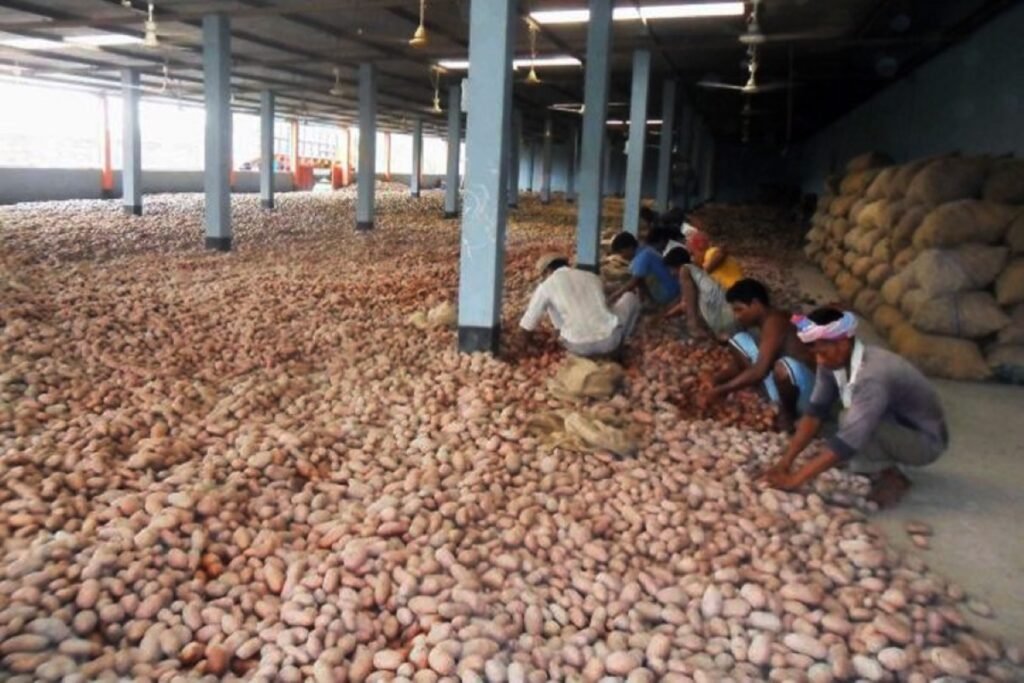Potato farmers in the northern districts of the country are facing severe difficulties in securing storage space in cold storage facilities for their harvested produce.
The situation has been exacerbated by sluggish cold storage operations, largely due to a shortage of manpower, as well as rising transport costs. Farmers and traders alike are growing increasingly frustrated as the delays persist.
Transport costs have reportedly surged to nearly double the usual rate.
“Due to the unusual delay in cold storage operations, transporters have increased the cost from Tk 35 to Tk 65 per sack of potatoes,” said Abdur Razzak, a farmer from Chirirbandar upazila.
Following the government’s imposition of a fee cap of Tk 6.75 per kilogramme for cold storage, both farmers and traders have rushed to secure storage slots. However, many farmers claim that cold storage operators are prioritising traders, despite regulations intended to ensure fair access.
According to the Department of Agricultural Extension in Rangpur, there are 101 cold storage facilities in the division with a total storage capacity of 1.1 million tonnes, which falls significantly short of demand.
Many farmers report having to wait for days outside storage facilities, only to see traders’ trucks being granted entry at night.
“I have been trying to get a storage permit for two days, but I am still waiting. Meanwhile, traders are storing thousands of sacks of potatoes every night,” said Jahangir Hossain, a farmer from Kalai upazila of Joypurhat.
Anwar Hossain, a farmer from Khetlal upazila, echoed similar frustrations.
Cold storage operators, however, attributed the delays to overwhelming demand.
Abdul Quddus, manager of Botalti Himadri Limited in Joypurhat, denied allegations of favouring traders.
“Both farmers and traders use our facilities. Due to the high profits from stored potatoes in recent years, farmers are now storing both seed and consumable potatoes, which has increased pressure on storage units. Despite the government’s 60:40 ratio favouring farmers, nearly 80% of our storage capacity is currently allocated to them,” he claimed.
Severe Congestion and Market Impact
The storage crisis has led to massive congestion outside cold storage facilities, particularly on the Dinajpur-Rangpur, Panchagarh-Rangpur, and Dinajpur-Gobindaganj highways, creating traffic disruptions and further driving up transportation costs.
In Dinajpur, over 700 potato-laden trucks have been seen queuing outside cold storage facilities, struggling to secure storage slots. The situation in Saidpur is even more critical, where three major cold storage facilities are struggling to accommodate the produce brought in from neighbouring areas such as Taraganj, Badarganj, Khansama, and Chirirbandar.
Abdul Mannan, a resident near Ismail Seed Cold Storage, reported that a three-kilometre stretch between Kamarpukur Bazar and Chikli Bazar has been blocked due to the tailback of waiting trucks.
In response, local authorities have deployed police and Ansar-VDP personnel to manage the situation.
“Encouraged by high prices last year, many farmers expanded their potato cultivation this season. However, the current shortage of storage space has led to severe congestion, rising transport costs, and falling market prices, with potatoes now selling for less than Tk 20 per kilogramme,” said Dhiman Bhushan, upazila agriculture officer in Saidpur.
“Farmers are suffering heavy financial losses due to these volatile market conditions,” he added.
Protests Over Cold Storage Rent Hike
Meanwhile, potato farmers in Kurigram staged a protest yesterday against the recent increase in cold storage rent, as reported by our correspondent from Kurigram.
The rally was held in front of the Kurigram Deputy Commissioner’s Office at noon, after which a memorandum was submitted to the Ministry of Commerce and the Department of Agricultural Marketing through the DC.
The protesting farmers have demanded that the Department of Agricultural Marketing reduce the cold storage fee from Tk 6.75 per kg to Tk 5 per kg to ease their financial burden.
Supplementary Information:
Potato is a staple crop in Bangladesh, with the northern districts being the major production hub. Cold storage is essential for preserving the harvested potatoes, especially as a significant portion is stored for later sale at higher prices. The rising cost of transportation, coupled with limited storage availability, is creating a crisis for farmers, many of whom rely on these facilities to avoid post-harvest losses. Experts suggest expanding cold storage capacity and improving infrastructure to address these recurring issues and stabilise the potato market.

